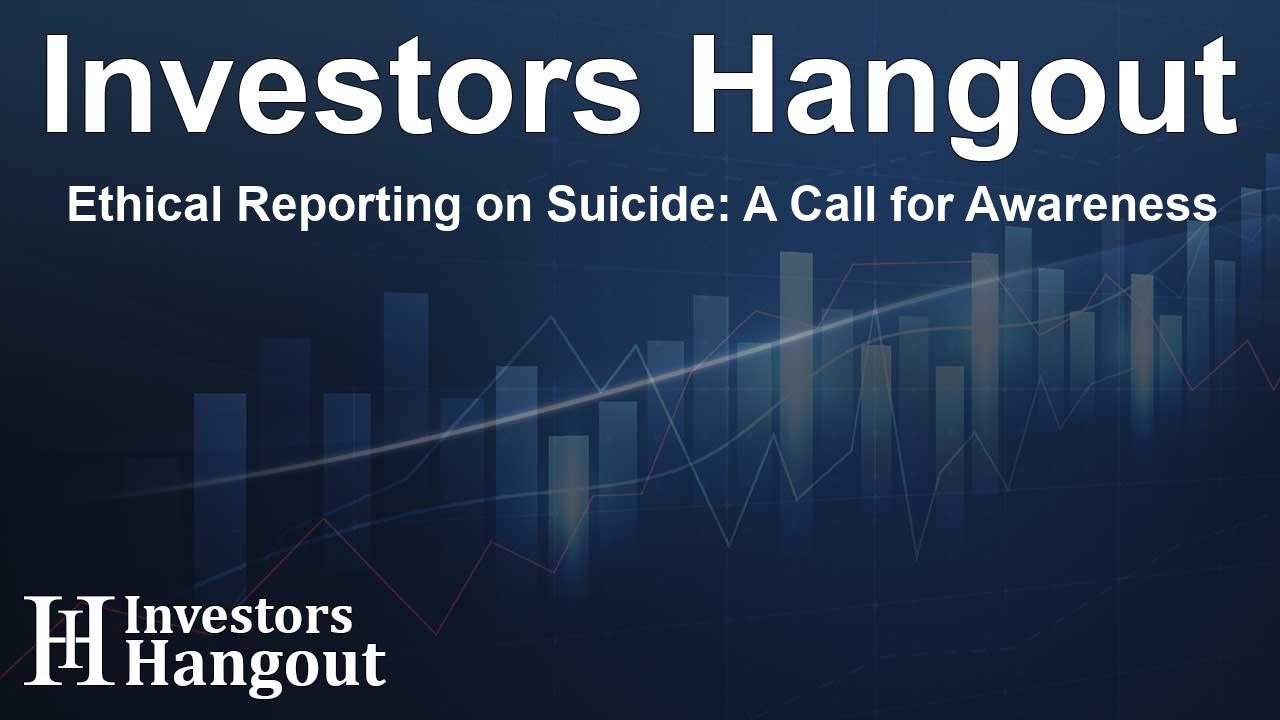Ethical Reporting on Suicide: A Call for Awareness

Understanding the Importance of Ethical Reporting
In recent discussions about mental health awareness, especially in relation to suicide, the role of the media cannot be overstated. It is essential for news outlets to adhere to ethical guidelines when reporting on suicide cases. The American Foundation for Suicide Prevention (AFSP) has emphasized the significance of how media coverage can profoundly influence public perception and response to mental health issues.
Life-Saving Actions and Public Health Impact
Celebrating efforts like those of individuals who intervene in potentially life-threatening situations is crucial. For instance, when figures in the public eye take life-saving actions, it is vital to recognize their contributions. Cases highlighting courageous interventions can serve as powerful reminders of collective responsibility in preventing suicides and supporting those in crisis.
Promoting Awareness of Risks and Support
Media plays a critical role in increasing awareness about suicide risk factors and warning signs. By promoting knowledge surrounding mental health priorities, journalists can guide vulnerable individuals toward help. Providing information on mental health resources alongside news reports can empower the community to take preventive measures.
Addressing Sensationalism in Reporting
One of the significant concerns in suicide reporting is the risk of sensationalism, which can contribute to a public health crisis. When reporting on suicide, it is essential to avoid graphic depictions and detailed descriptions of methods used. Instead, focus must be directed towards the recovery of individuals. Highlighting stories that inspire hope can foster a more supportive narrative.
Guidelines for Responsible Media Coverage
AFSP has outlined several guidelines to foster responsible reporting on suicide. These include refraining from including graphic details of methods, avoiding sensationalist language, and not attributing a suicide to single events or circumstances. It is essential to frame discussions around suicide within the broader context of mental health, understanding that various factors contribute to an individual's struggles.
Creating a Supportive Environment
Creating a supportive environment for discussing mental health can lead to better outcomes. The media can act as a bridge that connects individuals in need with appropriate resources. Sharing helpline information is invaluable, reminding the public that support is available should they find themselves or someone they know in crisis.
Encouraging Open Conversations about Mental Health
Encouraging open dialogues about mental health can dismantle stigmas surrounding suicide. By fostering an environment where individuals feel safe to share their experiences, media can play a pivotal role in destigmatizing these discussions, ultimately leading to improved mental health outcomes.
Resources for Further Learning
Those interested in learning more about responsible suicide reporting practices can refer to the comprehensive resources available through organizations dedicated to mental health. Joining community initiatives and programs focused on mental health awareness can also provide additional knowledge and opportunities for involvement.
Frequently Asked Questions
What is the goal of ethical reporting on suicide?
Ethical reporting aims to prevent suicide contagion by avoiding sensationalism and promoting mental health resources.
How can media influence public health regarding suicide?
The media can educate the public about mental health, raising awareness about warning signs and encouraging individuals to seek help.
Why is avoiding graphic details important in suicide reporting?
Graphic details can trigger vulnerable individuals and increase the risk of suicide contagion, contributing to a public health crisis.
What resources are available for media covering suicide?
Organizations like the AFSP provide guidelines and resources to help reporters cover suicide responsibly.
How can communities support mental health initiatives?
Communities can support initiatives by promoting awareness, providing access to resources, and encouraging open conversations about mental health.
About Investors Hangout
Investors Hangout is a leading online stock forum for financial discussion and learning, offering a wide range of free tools and resources. It draws in traders of all levels, who exchange market knowledge, investigate trading tactics, and keep an eye on industry developments in real time. Featuring financial articles, stock message boards, quotes, charts, company profiles, and live news updates. Through cooperative learning and a wealth of informational resources, it helps users from novices creating their first portfolios to experts honing their techniques. Join Investors Hangout today: https://investorshangout.com/
Disclaimer: The content of this article is solely for general informational purposes only; it does not represent legal, financial, or investment advice. Investors Hangout does not offer financial advice; the author is not a licensed financial advisor. Consult a qualified advisor before making any financial or investment decisions based on this article. The author's interpretation of publicly available data shapes the opinions presented here; as a result, they should not be taken as advice to purchase, sell, or hold any securities mentioned or any other investments. The author does not guarantee the accuracy, completeness, or timeliness of any material, providing it "as is." Information and market conditions may change; past performance is not indicative of future outcomes. If any of the material offered here is inaccurate, please contact us for corrections.